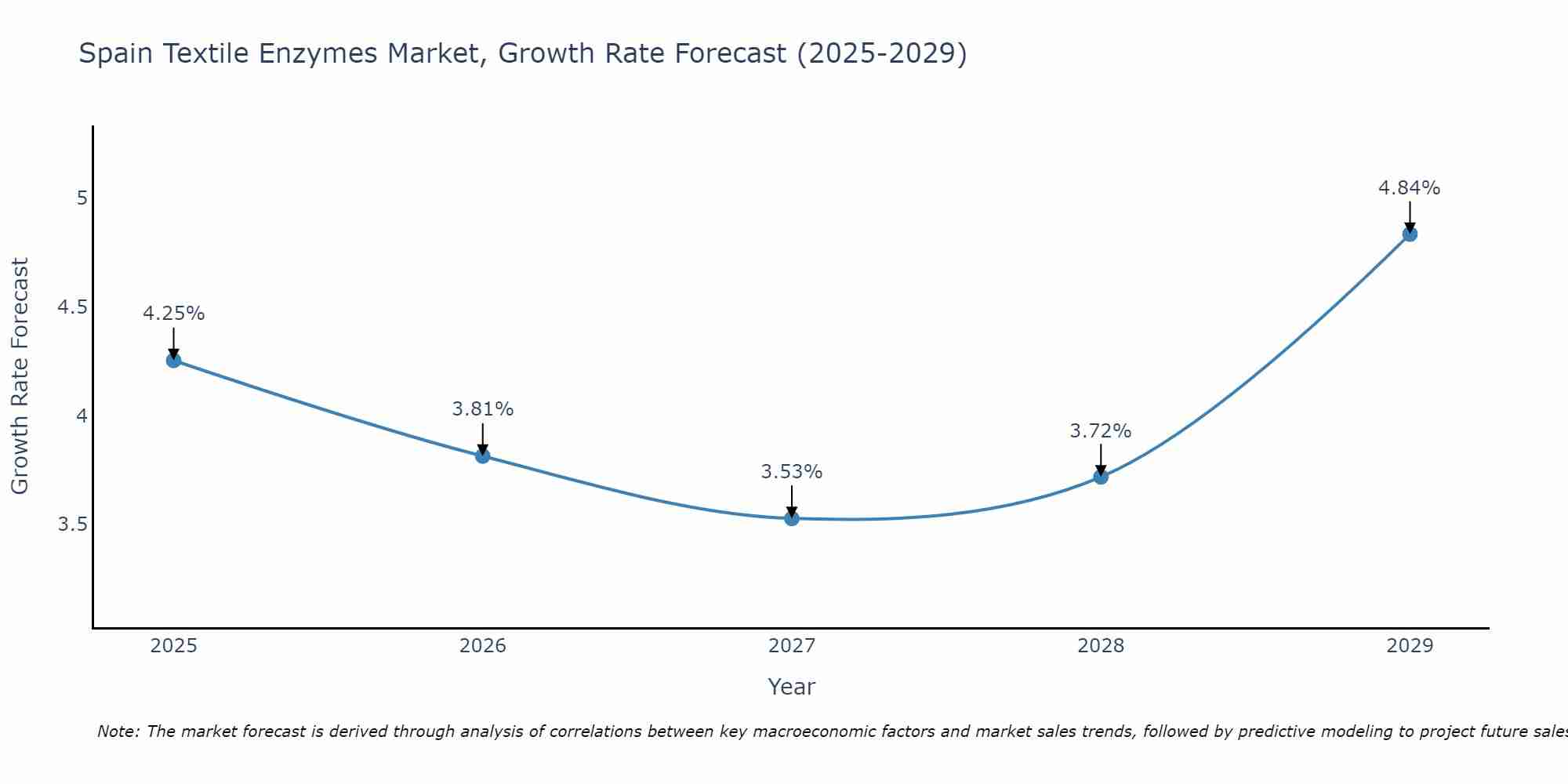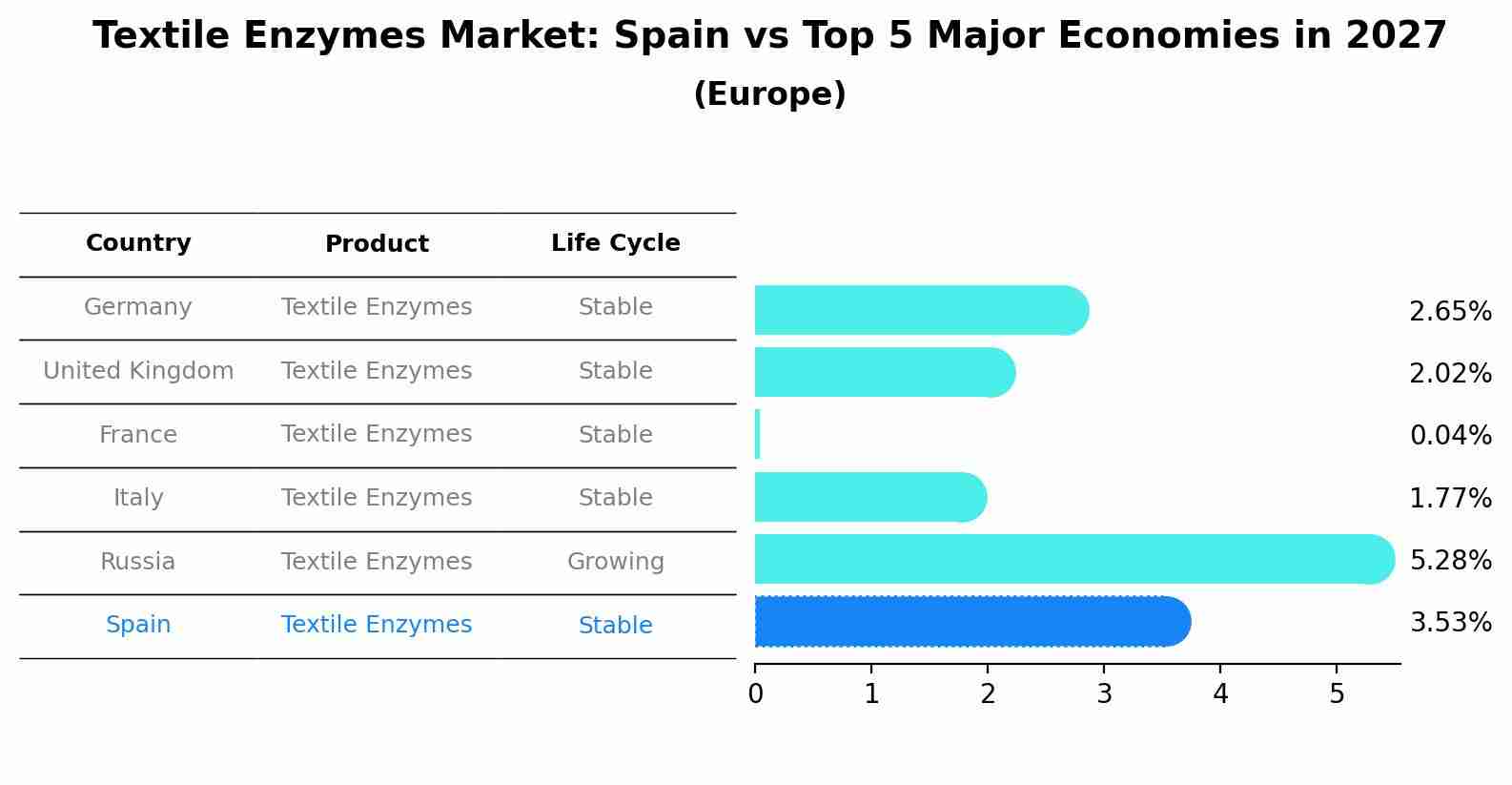Spain Textile Enzymes Market Outlook | Share, Size, Value, Trends, Companies, Industry, Analysis, Forecast, Growth, Revenue & COVID-19 IMPACT
| Product Code: ETC094053 | Publication Date: Jun 2021 | Updated Date: Jun 2025 | Product Type: Report | |
| Publisher: 6Wresearch | Author: Ravi Bhandari | No. of Pages: 70 | No. of Figures: 35 | No. of Tables: 5 |
Spain Textile Enzymes Market Size Growth Rate
The Spain Textile Enzymes Market is projected to witness mixed growth rate patterns during 2025 to 2029. The growth rate starts at 4.25% in 2025 and reaches 4.84% by 2029.

Textile Enzymes Market: Spain vs Top 5 Major Economies in 2027 (Europe)
By 2027, Spain's Textile Enzymes market is forecasted to achieve a stable growth rate of 3.53%, with Germany leading the Europe region, followed by United Kingdom, France, Italy and Russia.

Spain Textile Enzymes Market Overview
The Spain Textile Enzymes Market is experiencing steady growth due to increasing demand for eco-friendly textile processing solutions. Enzymes are utilized in various stages of textile production, such as desizing, bio-polishing, and denim finishing, to reduce water and energy consumption as well as the use of harsh chemicals. The market is witnessing a shift towards sustainable practices driven by stringent environmental regulations and growing consumer awareness regarding the harmful effects of traditional textile processing methods. Key players in the Spain Textile Enzymes Market include Novozymes A/S, DuPont de Nemours, Inc., and AB Enzymes GmbH, who are focusing on research and development activities to introduce innovative enzyme solutions tailored to the textile industry`s evolving needs. The market is expected to continue expanding as textile manufacturers increasingly adopt enzymatic solutions to improve production efficiency and reduce environmental impact.
Spain Textile Enzymes Market Trends
The Spain Textile Enzymes Market is witnessing a growing demand for eco-friendly and sustainable textile processing solutions. Enzymes are being increasingly used in the textile industry to reduce water consumption, energy usage, and chemical usage in various processes such as desizing, bio-polishing, and denim finishing. The market is also seeing a rise in the demand for enzymes that can enhance the performance and quality of textiles while minimizing the environmental impact of production. Additionally, there is a growing focus on developing enzymes that are more efficient and versatile in their applications, catering to the evolving needs of textile manufacturers in Spain. Overall, sustainability, efficiency, and innovation are driving the current trends in the Spain Textile Enzymes Market.
Spain Textile Enzymes Market Challenges
In the Spain Textile Enzymes Market, some of the key challenges faced include increasing competition from other textile processing technologies, fluctuating raw material prices, and stringent environmental regulations. The competition from alternative processing methods such as chemical treatments and mechanical processes poses a challenge to the adoption of textile enzymes. Additionally, the volatility in raw material prices can impact production costs and profit margins for companies operating in the market. Moreover, the strict environmental regulations in Spain require textile manufacturers to adhere to sustainability standards, which may involve additional costs for implementing eco-friendly practices. Overall, navigating these challenges while maintaining competitiveness and compliance with regulations remains a significant hurdle for players in the Spain Textile Enzymes Market.
Spain Textile Enzymes Market Investment Opportunities
Investment opportunities in the Spain Textile Enzymes Market include the growing demand for eco-friendly and sustainable textile production processes. Enzymes are increasingly used in the textile industry to replace harsh chemicals traditionally used in processes such as desizing, bio-polishing, and denim finishing. This shift towards eco-friendly solutions is driven by consumer awareness and regulatory pressure to reduce environmental impact. Additionally, the textile industry in Spain is a significant contributor to the country`s economy, providing a stable market for enzyme suppliers. Investing in research and development of innovative enzyme solutions tailored to the specific needs of the Spanish textile market can provide a competitive edge and capitalize on the increasing demand for sustainable textile production practices.
Spain Textile Enzymes Market Government Policy
Government policies related to the Spain Textile Enzymes Market focus on promoting sustainable practices and innovation in the industry. Initiatives such as the Circular Economy Strategy and the National Industry Plan for the Textile, Fashion, Leather, and Footwear Sectors prioritize reducing environmental impact and increasing resource efficiency. Additionally, the government provides support for research and development projects aimed at improving enzyme technology in textile production processes. Regulations also emphasize compliance with strict environmental standards to ensure the safety of workers and consumers. Overall, the policies aim to drive growth in the Spain Textile Enzymes Market by encouraging the adoption of eco-friendly practices and fostering competitiveness in the global market.
Spain Textile Enzymes Market Future Outlook
The Spain Textile Enzymes Market is poised for steady growth in the coming years due to increasing demand for sustainable and eco-friendly textile production processes. Enzymes offer numerous benefits such as reduced water and energy consumption, shorter processing times, and improved product quality, which align with the growing trend towards sustainable practices in the textile industry. Additionally, the rising consumer awareness regarding the environmental impact of traditional textile manufacturing methods is driving textile manufacturers in Spain to adopt enzyme-based solutions. Key players in the market are focusing on research and development activities to introduce innovative enzyme products that cater to specific textile processing requirements, further fueling market growth. Overall, the Spain Textile Enzymes Market is expected to witness significant expansion as the industry shifts towards more sustainable and efficient production practices.
Key Highlights of the Report:
- Spain Textile Enzymes Market Outlook
- Market Size of Spain Textile Enzymes Market, 2021
- Forecast of Spain Textile Enzymes Market, 2027
- Historical Data and Forecast of Spain Textile Enzymes Revenues & Volume for the Period 2018 - 2027
- Spain Textile Enzymes Market Trend Evolution
- Spain Textile Enzymes Market Drivers and Challenges
- Spain Textile Enzymes Price Trends
- Spain Textile Enzymes Porter's Five Forces
- Spain Textile Enzymes Industry Life Cycle
- Historical Data and Forecast of Spain Textile Enzymes Market Revenues & Volume By Type for the Period 2018 - 2027
- Historical Data and Forecast of Spain Textile Enzymes Market Revenues & Volume By Cellulase for the Period 2018 - 2027
- Historical Data and Forecast of Spain Textile Enzymes Market Revenues & Volume By Amylase for the Period 2018 - 2027
- Historical Data and Forecast of Spain Textile Enzymes Market Revenues & Volume By Catalase for the Period 2018 - 2027
- Historical Data and Forecast of Spain Textile Enzymes Market Revenues & Volume By Pectinase for the Period 2018 - 2027
- Historical Data and Forecast of Spain Textile Enzymes Market Revenues & Volume By Laccase for the Period 2018 - 2027
- Historical Data and Forecast of Spain Textile Enzymes Market Revenues & Volume By Others for the Period 2018 - 2027
- Historical Data and Forecast of Spain Textile Enzymes Market Revenues & Volume By Application for the Period 2018 - 2027
- Historical Data and Forecast of Spain Textile Enzymes Market Revenues & Volume By Bio-polishing for the Period 2018 - 2027
- Historical Data and Forecast of Spain Textile Enzymes Market Revenues & Volume By Desizing for the Period 2018 - 2027
- Historical Data and Forecast of Spain Textile Enzymes Market Revenues & Volume By Enzymatic Bleaching for the Period 2018 - 2027
- Historical Data and Forecast of Spain Textile Enzymes Market Revenues & Volume By Bioscouring for the Period 2018 - 2027
- Historical Data and Forecast of Spain Textile Enzymes Market Revenues & Volume By Others for the Period 2018 - 2027
- Spain Textile Enzymes Import Export Trade Statistics
- Market Opportunity Assessment By Type
- Market Opportunity Assessment By Application
- Spain Textile Enzymes Top Companies Market Share
- Spain Textile Enzymes Competitive Benchmarking By Technical and Operational Parameters
- Spain Textile Enzymes Company Profiles
- Spain Textile Enzymes Key Strategic Recommendations
Frequently Asked Questions About the Market Study (FAQs):
- Single User License$ 1,995
- Department License$ 2,400
- Site License$ 3,120
- Global License$ 3,795
Search
Related Reports
- ASEAN Bearings Market (2025-2031) | Strategy, Consumer Insights, Analysis, Investment Trends, Opportunities, Growth, Size, Share, Industry, Revenue, Segments, Value, Segmentation, Supply, Forecast, Restraints, Outlook, Competition, Drivers, Trends, Demand, Pricing Analysis, Competitive, Strategic Insights, Companies, Challenges
- Europe Flooring Market (2025-2031) | Outlook, Share, Industry, Trends, Forecast, Companies, Revenue, Size, Analysis, Growth & Value
- Saudi Arabia Manlift Market (2025-2031) | Outlook, Size, Growth, Trends, Companies, Industry, Revenue, Value, Share, Forecast & Analysis
- Uganda Excavator, Crane, and Wheel Loaders Market (2025-2031) | Strategy, Consumer Insights, Analysis, Investment Trends, Opportunities, Growth, Size, Share, Industry, Revenue, Segments, Value, Segmentation, Supply, Forecast, Restraints, Outlook, Competition, Drivers, Trends, Demand, Pricing Analysis, Competitive, Strategic Insights, Companies, Challenges
- Rwanda Excavator, Crane, and Wheel Loaders Market (2025-2031) | Strategy, Consumer Insights, Analysis, Investment Trends, Opportunities, Growth, Size, Share, Industry, Revenue, Segments, Value, Segmentation, Supply, Forecast, Restraints, Outlook, Competition, Drivers, Trends, Demand, Pricing Analysis, Competitive, Strategic Insights, Companies, Challenges
- Kenya Excavator, Crane, and Wheel Loaders Market (2025-2031) | Strategy, Consumer Insights, Analysis, Investment Trends, Opportunities, Growth, Size, Share, Industry, Revenue, Segments, Value, Segmentation, Supply, Forecast, Restraints, Outlook, Competition, Drivers, Trends, Demand, Pricing Analysis, Competitive, Strategic Insights, Companies, Challenges
- Angola Excavator, Crane, and Wheel Loaders Market (2025-2031) | Strategy, Consumer Insights, Analysis, Investment Trends, Opportunities, Growth, Size, Share, Industry, Revenue, Segments, Value, Segmentation, Supply, Forecast, Restraints, Outlook, Competition, Drivers, Trends, Demand, Pricing Analysis, Competitive, Strategic Insights, Companies, Challenges
- Israel Intelligent Transport System Market (2025-2031) | Strategy, Consumer Insights, Analysis, Investment Trends, Opportunities, Growth, Size, Share, Industry, Revenue, Segments, Value, Segmentation, Supply, Forecast, Restraints, Outlook, Competition, Drivers, Trends, Demand, Pricing Analysis, Competitive, Strategic Insights, Companies, Challenges
- Uganda Precast and Aggregate Market (2025-2031) | Strategy, Consumer Insights, Analysis, Investment Trends, Opportunities, Growth, Size, Share, Industry, Revenue, Segments, Value, Segmentation, Supply, Forecast, Restraints, Outlook, Competition, Drivers, Trends, Demand, Pricing Analysis, Competitive, Strategic Insights, Companies, Challenges
- Australia IT Asset Disposal Market (2025-2031) | Strategy, Consumer Insights, Analysis, Investment Trends, Opportunities, Growth, Size, Share, Industry, Revenue, Segments, Value, Segmentation, Supply, Forecast, Restraints, Outlook, Competition, Drivers, Trends, Demand, Pricing Analysis, Competitive, Strategic Insights, Companies, Challenges
Industry Events and Analyst Meet
Our Clients
Whitepaper
- Middle East & Africa Commercial Security Market Click here to view more.
- Middle East & Africa Fire Safety Systems & Equipment Market Click here to view more.
- GCC Drone Market Click here to view more.
- Middle East Lighting Fixture Market Click here to view more.
- GCC Physical & Perimeter Security Market Click here to view more.
6WResearch In News
- Doha a strategic location for EV manufacturing hub: IPA Qatar
- Demand for luxury TVs surging in the GCC, says Samsung
- Empowering Growth: The Thriving Journey of Bangladesh’s Cable Industry
- Demand for luxury TVs surging in the GCC, says Samsung
- Video call with a traditional healer? Once unthinkable, it’s now common in South Africa
- Intelligent Buildings To Smooth GCC’s Path To Net Zero













